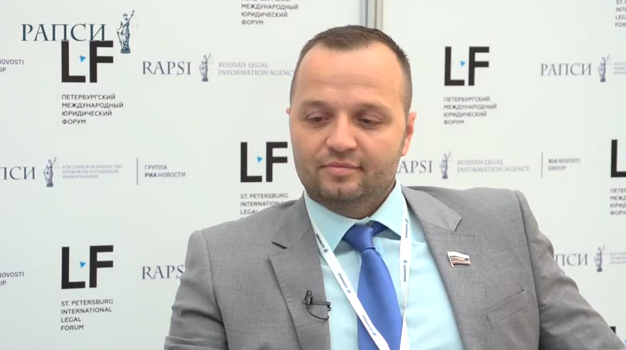Konstantin Dobrynin, deputy head of the constitutional law committee of Russia’s upper house of parliament, the Federation Council, visited RAPSI’s open studio at the St. Petersburg International Legal Forum to speak about the role of foreign lawyers on the local legal market, achievements of Russian lawyers and specific features of Russian legislation.
The quality of the work provided by legal consultants, especially Western ones, was put in question after the Permanent Court of Arbitration in The Hague ruled against Russia in a case regarding the alleged expropriation of Yukos assets, ordering it to pay about 50 billion in damages, according to Dobrynin.
“That being said, I don't believe Western legal advisors should be prohibited from working in Russia. This should not and cannot be the case, because it would be foolish, and pointless, and in the end we would only be harming ourselves. If you want to be the best, you need to compete with the best, learn how to win, and learn how to offer higher quality services, in order to do the best you can for your client,” Dobrynin said.
He praised the potential of the Russian legal market, noting that it has chosen a cohesive route toward further development. “At present, we are actively developing the market. Previously, this development had been somewhat chaotic. But now, everyone understands what is needed. A key issue that we still need to resolve is that of who has the right to give qualified legal assistance,” Dobrynin said.
The interests of business and favorable conditions for their success is another key issue which needs to be attended to, he added. “If you act according to the rules, you will benefit from the law. As such, the state should be very honest, very public, in declaring and performing its part of the deal. Only then will businesses see that yes, in deed, no one's here to cheat. Guarantees have been received, and rules have been legally implemented and they work. That will set a conscious change in motion,” Dobrynin said.
Finally, he pointed to the issue of the “sporadic nature” of Russian legislation when baseless and seemingly absurd legislative amendments are introduced. Administrative and criminal law are especially affected by this phenomenon, according to the senator. Criminal law is an extremely delicate matter, he added, and it needs to be approached carefully: “It is so meticulously connected and assembled, properly codified, that it's impossible to get in there with a scalpel. First, we must install specific rules. Only then can we understand if the law is failing to do its job, or whether the problem lies with law enforcement.”
The Civil Code is a different issue, as it has undergone significant revisions. “The amendments were long overdue, according to Dobrynin. “It should be understood that in the nearly 20 years since the Civil Code was adopted, the economy and the country as a whole have bounded forward. The complex relationships between laws have, accordingly, become much broader. But from a civil law perspective, legislators, lawyers, and practitioners are moving in the right direction,” he said.



